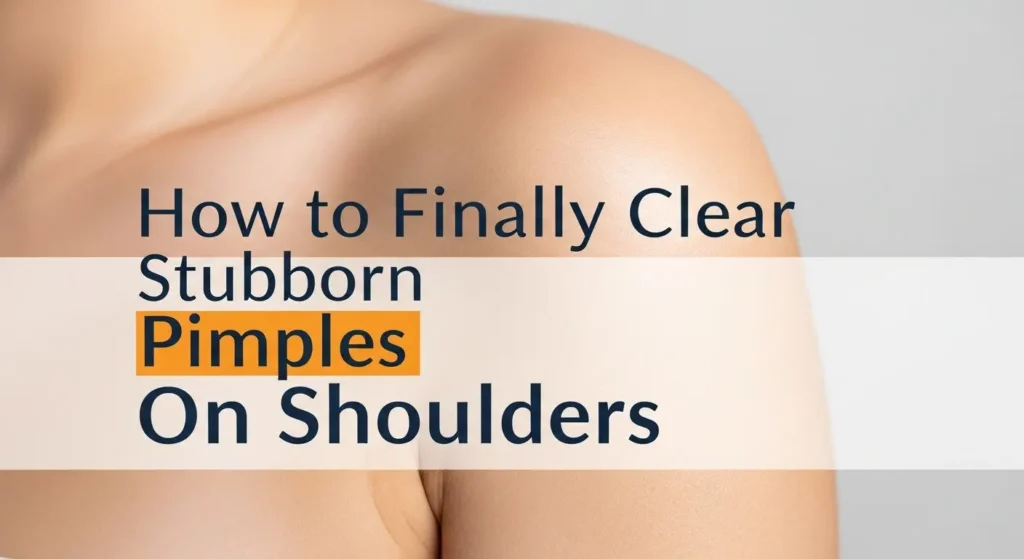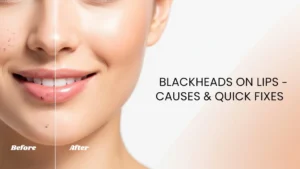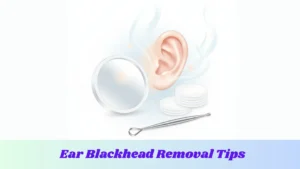Introduction
Do you ever feel self-conscious about those pesky pimples on shoulders? You're not alone! Many people struggle with pimples on shoulders, and sometimes, they can feel incredibly stubborn, refusing to budge no matter what you try. It's frustrating, especially when you want to wear a tank top or feel confident in your skin. But here's the good news: clearing up pimples on shoulders are absolutely possible!

In this guide, we're diving deep into why these breakouts happen and, more importantly, how to get rid of them for good. We'll cover everything from simple daily habits to effective treatments, helping you understand your skin better and achieve the smooth, clear shoulders you desire. Get ready to uncover the secrets to banishing those pimples on shoulders and feeling great in your own skin!
Key Takeaways
- Understand the Cause: Pimples on shoulders can be acne or folliculitis, often triggered by sweat, friction from clothing, and certain products.
- Prioritize Prevention: Simple daily habits like showering after sweating, wearing breathable fabrics, and using non-comedogenic products are crucial.
- Targeted Treatments Work: Over-the-counter options like Salicylic Acid and Benzoyl Peroxide are effective, but stubborn cases might need a dermatologist's help for prescription solutions.
- Consistency is Key: Stick to your chosen routine for several weeks, moisturize, and avoid picking to see lasting results.
- Seek Professional Help: If pimples are painful, widespread, or cause scarring, a dermatologist can offer advanced treatments and personalized advice.
Understanding Pimples On Shoulders: What Are They and Why Are They So Stubborn?
Before we can tackle shoulder pimples, it helps to know what we're up against. These pimples on shoulders aren't always the same, and understanding the type can guide you to the right treatment.
Acne Vulgaris vs. Folliculitis: What's the Difference?
When you see a “pimple” on your shoulder, it's usually one of two main things:
- Acne Vulgaris: This is the most common type of acne, the same kind you might get on your face. It happens when your hair follicles (pores) get clogged with oil (sebum), dead skin cells, and bacteria (P. acnes). This leads to:
- Blackheads: Open clogged pores, dark on top.
- Whiteheads: Closed clogged pores, small bumps.
- Pimples/Pustules: Red, tender bumps with a white center.
- Cysts/Nodules: Large, painful, deep lumps under the skin.
- **Did You Know?** Your back and shoulders have a high concentration of sebaceous (oil) glands, making them prone to breakouts just like your face!
- Folliculitis: This is a different beast! Folliculitis occurs when hair follicles become inflamed, usually due to a bacterial or fungal infection. It often looks like small, red, itchy bumps that can sometimes have a white head, much like pimples. The key difference is that it's an inflammation of the hair follicle itself, not necessarily a clogged pore in the same way acne is.
- How to tell them apart: Folliculitis often appears in areas of friction or shaving, can be itchy, and might clear up with antibacterial or antifungal washes. Acne is usually less itchy and more focused on oil production.
Common Triggers for Pimples On Shoulders Breakouts
Why do these pimples pop up on your shoulders specifically? Several factors contribute:
- Sweat and Heat: Your shoulders often get sweaty, especially during exercise or in warm weather. Sweat mixes with dead skin cells and bacteria, creating a perfect breeding ground for breakouts.
- Friction and Pressure: Tight clothing, backpack straps, sports equipment (like shoulder pads), or even leaning on your shoulders can rub against your skin. This friction irritates hair follicles and pushes oil and bacteria deeper into pores.
- Hair Products: Conditioners, hair oils, or styling products can run down your back and shoulders in the shower or throughout the day, clogging pores.
- Dirty Clothes & Bedding: Re-wearing sweaty clothes or not changing your sheets regularly can transfer bacteria and grime back onto your skin.
- Hormonal Changes: Just like facial acne, hormonal fluctuations (e.g., during puberty, menstruation, pregnancy, or stress) can increase oil production, leading to breakouts.
- Diet: While diet's role in acne is complex, some studies suggest high-glycemic foods (sugary snacks, refined carbs) and dairy might worsen acne for some individuals.
- Genetics: If your parents had body acne, you might be more prone to it too.
- Certain Medications: Some drugs can cause acne as a side effect.
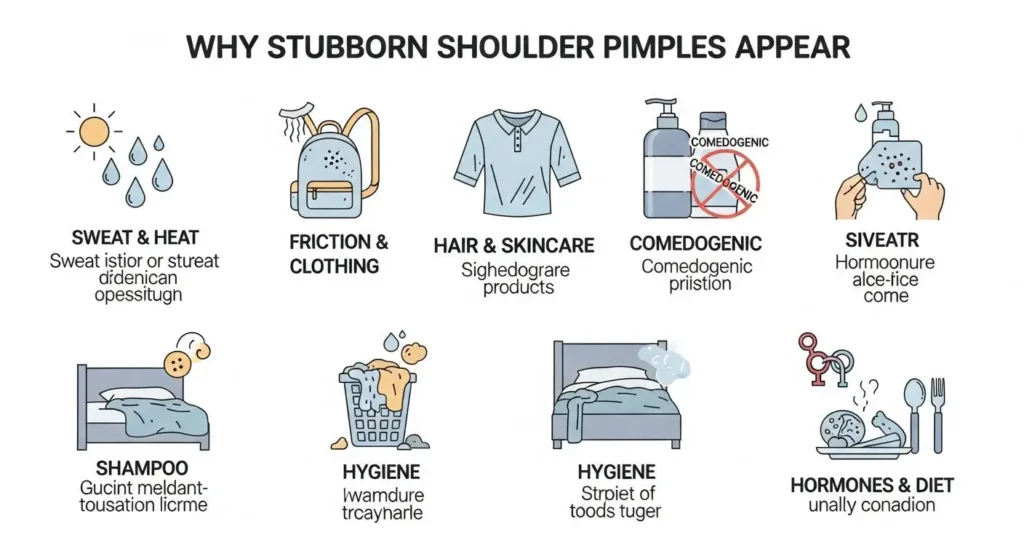
Prevention Strategies: Your First Line of Defense
Prevention is always better than cure, especially when it comes to stubborn pimples on shoulders. By making a few simple changes to your daily routine, you can significantly reduce breakouts.
Smart Showering Habits
This is perhaps the most crucial step!
- Shower Immediately After Sweating: Whether it's after a workout, a long walk, or just a hot day, don't let sweat linger on your skin. It mixes with dead skin cells and bacteria, creating a perfect storm for clogged pores.
- Use a Gentle Body Cleanser: Look for a body wash that is “non-comedogenic” (meaning it won't clog pores). Avoid harsh scrubs or abrasive sponges, as these can irritate your skin and worsen inflammation. Your skin needs gentle care, not scrubbing!
- Wash Hair First: If you have long hair, wash and rinse your shampoo and conditioner before washing your body. This prevents product residue from running down your back and shoulders and clogging pores.
- Rinse Thoroughly: Make sure you're rinsing all soap and hair product residue off your shoulders. Leftover suds can be just as problematic as sweat.
Clothing Choices: What You Wear Matters
Your wardrobe can be a secret weapon or a hidden enemy against pimples on shoulders.
- Opt for Breathable Fabrics: Cotton, linen, and moisture-wicking synthetic fabrics (like those used in activewear) allow your skin to breathe and help prevent sweat buildup.
- Choose Loose-Fitting Clothes: Tight clothing rubs against your skin, causing friction that can irritate hair follicles and push bacteria into pores. Loose tops and dresses reduce this irritation.
- Wear Clean Clothes Daily: Don't re-wear sweaty or dirty clothes, especially those that come into direct contact with your shoulders. Change into fresh clothes after exercising.
Laundry Care: Keep It Clean
Your laundry routine plays a bigger role than you might think!
- Use Hypoallergenic Detergents: Some harsh detergents or fabric softeners can irritate sensitive skin and trigger breakouts. Opt for “free and clear” options without dyes and perfumes.
- Rinse Twice: If you suspect detergent residue might be an issue, run an extra rinse cycle to ensure all product is washed away.
- Change Bedding Regularly: Your pillowcases and sheets collect sweat, oil, and dead skin cells. Change them at least once a week, and more often if you sweat a lot at night.
Product Choices: Be Mindful of What You Apply
Not all skincare and hair products are created equal when it comes to acne-prone skin.
- Non-Comedogenic is Key: When buying lotions, sunscreens, or body oils, always look for labels that say “non-comedogenic,” “oil-free,” or “won't clog pores.”
- Hair Products: If you use heavy conditioners, hair masks, or styling products, try to keep them off your shoulders. Consider using a light, non-comedogenic leave-in conditioner if you need one, and always rinse your hair thoroughly.
Diet and Lifestyle: A Holistic Approach
What you put into your body and how you live can impact your skin's health.
- Stay Hydrated: Drinking plenty of water helps your body function optimally, including your skin.
- Balanced Diet: Focus on whole foods, plenty of fruits and vegetables, and lean proteins. While specific foods don't cause acne for everyone, some people find that reducing high-glycemic foods (sugary snacks, white bread) and dairy helps improve their skin. Eating a balanced diet helps your body function better overall. For example, understanding your normal blood sugar reading can highlight how diet impacts your general health, which in turn can affect your skin.
- Manage Stress: Stress can trigger hormonal changes that lead to increased oil production. Find healthy ways to manage stress, like exercise, meditation, or spending time in nature.
- Get Enough Sleep: Your body repairs itself during sleep, and this includes your skin. Aim for 7-9 hours of quality sleep each night.
Sun Protection
While sun exposure might temporarily dry out pimples, it can also lead to hyperpigmentation (dark spots) and increase your risk of skin damage. Always use a non-comedogenic sunscreen, especially if you're using acne treatments that can make your skin more sensitive to the sun. Learning about skin cancer prevention is crucial for long-term skin health.
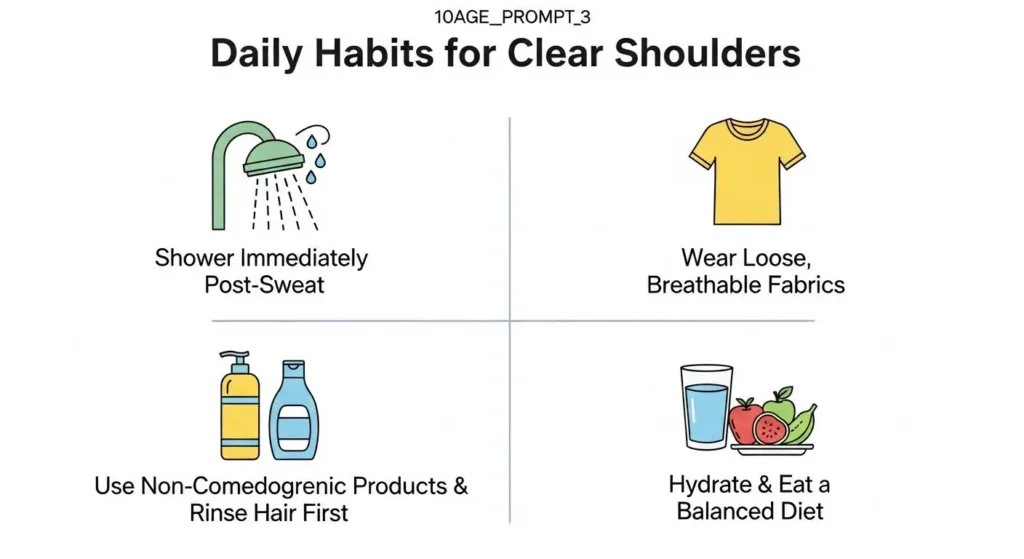
Targeted Treatments: What Really Works for Pimples On Shoulders
When prevention isn't enough, it's time to bring in the big guns – targeted treatments. There are many effective options available, from over-the-counter (OTC) products to prescription medications.
Over-the-Counter (OTC) Solutions
These are your first line of attack for mild to moderate pimples on shoulders. Look for body washes, lotions, or creams containing these active ingredients:
- Salicylic Acid (BHA):
- How it works: This oil-soluble acid penetrates deep into pores to dissolve dead skin cells and oil, preventing clogs. It's excellent for blackheads, whiteheads, and mild red bumps.
- Products: You'll find it in body washes (e.g., 2% concentration), sprays, and lotions.
- Tip: Use a salicylic acid body wash daily in the shower. Leave it on your skin for a minute or two before rinsing for best results.
- Benzoyl Peroxide (BPO):
- How it works: BPO is a powerful ingredient that kills acne-causing bacteria (P. acnes) and helps shed dead skin cells. It's very effective for inflamed pimples (red bumps and pustules).
- Products: Available in various concentrations (2.5%, 5%, 10%) in washes, creams, and gels. Start with a lower concentration (2.5% or 5%) to avoid irritation.
- Tip: Benzoyl peroxide can bleach fabrics (towels, clothing, bedding), so apply it carefully and let it dry completely before dressing or going to bed. Using white towels and sheets can help.
- Sulfur:
- How it works: Sulfur helps dry out oil and shed dead skin cells. It's often combined with other acne-fighting ingredients. It's generally gentler than BPO.
- Products: Found in some body washes and spot treatments.
Application Tips for OTCs:
- Be Consistent: These products need to be used regularly, usually once or twice a day, to be effective.
- Patch Test: If you have sensitive skin, test a new product on a small area of your skin first to check for irritation.
- Moisturize: Acne treatments can be drying. Follow up with a light, non-comedogenic moisturizer to keep your skin hydrated and prevent excessive dryness, which can actually trigger more oil production.
Prescription Topicals: When OTCs Aren't Enough
If OTC treatments aren't clearing your pimples on shoulders after 6-8 weeks, it's time to consult a dermatologist. They can prescribe stronger topical medications.
- Topical Retinoids (e.g., Tretinoin, Adapalene):
- How it works: These vitamin A derivatives increase cell turnover, helping to unclog pores and prevent new breakouts. They also reduce inflammation and can improve skin texture.
- Tip: Retinoids can make your skin more sensitive to the sun, so always use sunscreen. Start slowly (every other night) to minimize irritation.
- Topical Antibiotics (e.g., Clindamycin, Erythromycin):
- How it works: These reduce acne-causing bacteria and inflammation. They are often prescribed alongside Benzoyl Peroxide to prevent bacterial resistance.
- Azelaic Acid:
- How it works: This acid helps unclog pores, reduces bacteria, and calms inflammation. It's also great for reducing post-inflammatory hyperpigmentation (dark spots left after pimples heal).
Professional Treatments (Briefly)
For very stubborn or widespread shoulder acne, a dermatologist might recommend in-office procedures:
- Chemical Peels: Can help exfoliate the skin and reduce breakouts.
- Extractions: A professional can safely remove blackheads and whiteheads. Just like with ear blackhead removal or blackheads on lips, picking yourself can worsen the problem and lead to scars.
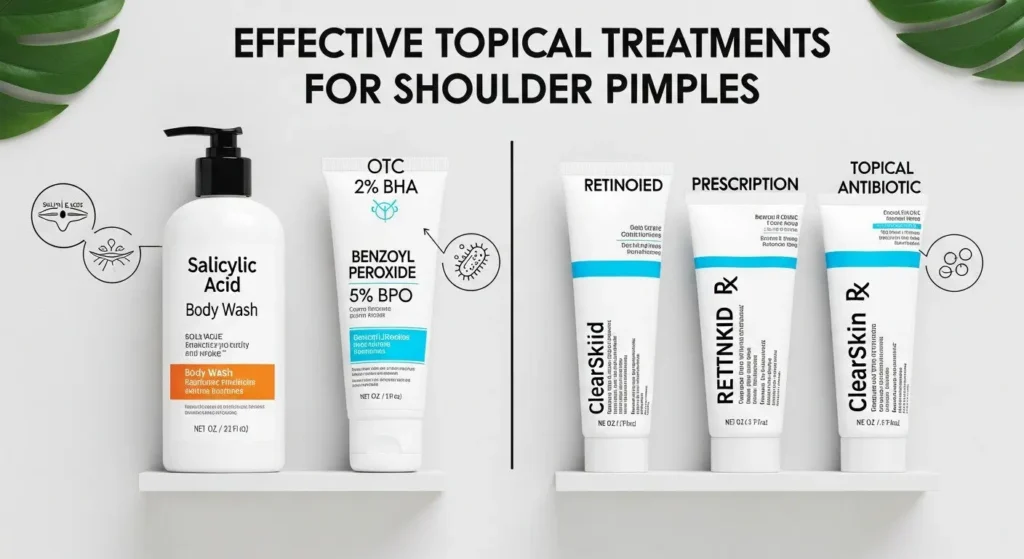
Natural & Home Remedies: Gentle Support for Your Skin
While not as potent as medical treatments for severe cases, several natural remedies can offer gentle support, reduce inflammation, and complement your main routine.
- Tea Tree Oil:
- How it works: Known for its antibacterial and anti-inflammatory properties.
- How to use: Always dilute pure tea tree oil with a carrier oil (like jojoba or almond oil) before applying it to your skin. A common ratio is 1 part tea tree oil to 9 parts carrier oil. Apply with a cotton swab to individual pimples on shoulders.
- Caution: Can be irritating if used undiluted.
- Apple Cider Vinegar (ACV):
- How it works: ACV has mild exfoliating properties and can help balance skin pH.
- How to use: Dilute raw, unfiltered ACV with water (e.g., 1 part ACV to 3-4 parts water). Apply to affected areas with a cotton ball, let it sit for a few minutes, then rinse.
- Caution: Always dilute to prevent irritation.
- Aloe Vera:
- How it works: Soothing, anti-inflammatory, and promotes healing.
- How to use: Apply pure aloe vera gel (from the plant or a high-quality product) to inflamed areas to calm redness and irritation.
- Green Tea:
- How it works: Rich in antioxidants and has anti-inflammatory properties.
- How to use: Brew a cup of green tea, let it cool, and then apply it to your shoulders with a cotton ball or as a compress. You can also use cooled, used green tea bags directly on inflamed spots.
- Honey:
- How it works: Natural antibacterial and anti-inflammatory properties, also moisturizing.
- How to use: Apply a thin layer of raw honey to the affected area, leave it on for 15-20 minutes, then rinse off with warm water.
- Warm Compresses:
- How it works: Can help bring deep, painful cysts to a head and reduce inflammation.
- How to use: Soak a clean cloth in warm water, wring it out, and apply it to the affected area for 10-15 minutes, several times a day.
Natural Tip: While natural remedies can be helpful, they work best as a complementary approach. For stubborn or severe pimples on shoulders, medical treatments are usually more effective.
When to See a Dermatologist
Sometimes, despite your best efforts with OTC products and home remedies, pimples on shoulders just won't go away. This is when it's crucial to seek professional help from a dermatologist. They can offer stronger treatments and personalized advice.
When to Make That Appointment:
- No Improvement with OTCs: If you've been consistently using over-the-counter treatments for 6-8 weeks and haven't seen significant improvement, it's time for a professional assessment.
- Severe, Painful, or Cystic Acne: If your shoulders are covered in many inflamed pimples, deep, painful cysts, or nodules, a dermatologist can offer more potent solutions to prevent scarring.
- Scarring: If you notice dark spots (post-inflammatory hyperpigmentation) or pitted scars forming, early intervention can help minimize their appearance.
- Widespread Breakouts: If the acne extends beyond your shoulders to your back, chest, or other areas, it might indicate a more systemic issue requiring a doctor's attention.
- Itchy Bumps: If your shoulder bumps are particularly itchy, it might be folliculitis or another skin condition that needs specific diagnosis and treatment.
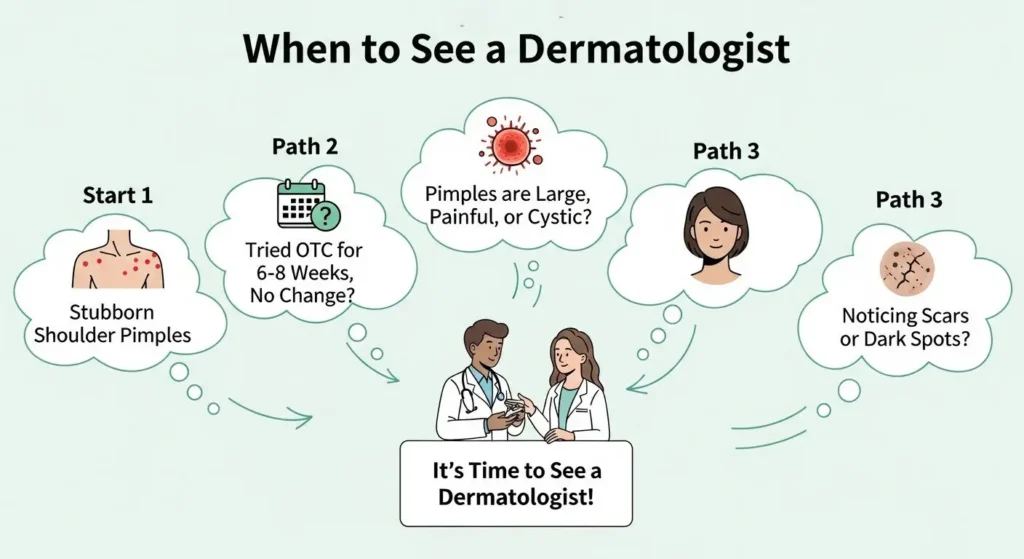
What a Dermatologist Can Offer:
Dermatologists have a wide range of tools and treatments at their disposal:
- Oral Medications:
- Antibiotics: For moderate to severe inflammatory acne, oral antibiotics (like doxycycline or minocycline) can reduce bacteria and inflammation throughout the body. They are usually prescribed for a limited time.
- Isotretinoin (Accutane): This powerful oral medication is reserved for severe, stubborn, or cystic acne that hasn't responded to other treatments. It significantly reduces oil production and can clear acne permanently for many. It requires careful monitoring due to potential side effects.
- Hormonal Therapy: For women, certain birth control pills or anti-androgen medications (like spironolactone) can help regulate hormones that contribute to acne.
- In-Office Procedures:
- Corticosteroid Injections: For large, painful cysts, a dermatologist can inject a corticosteroid directly into the lesion to reduce inflammation and speed healing.
- Chemical Peels: Stronger peels than OTC versions can be performed in-office to exfoliate the skin and improve acne.
- Laser and Light Therapies: Various laser and light treatments can target acne bacteria, reduce oil production, and improve acne scarring.
- Drainage and Extraction: For very large or persistent cysts, a dermatologist can safely drain them to relieve pain and promote healing.
Expert Advice: Don't hesitate to see a dermatologist. Early intervention can prevent worsening acne, reduce pain, and minimize the risk of permanent scarring.
Maintaining Clear Shoulders: Long-Term Strategies
Clearing stubborn pimples on shoulders is a journey, not a sprint. Once you've achieved clearer skin, the goal is to maintain it and prevent future breakouts.
- Consistency is Your Best Friend: Don't stop your effective routine just because your skin looks better. Continue using your chosen cleansers, treatments, and moisturizers daily to keep breakouts at bay. Think of it as maintenance for your skin.
- Keep Moisturizing: Even if your skin is oily, it still needs moisture. Using acne treatments can be drying, so a light, non-comedogenic moisturizer is essential to keep your skin barrier healthy and prevent irritation.
- Resist the Urge to Pick: We know it's tempting, but picking, squeezing, or popping pimples on shoulders can push bacteria deeper, worsen inflammation, lead to infection, and cause permanent scarring or dark spots. Leave extractions to the professionals. Just like with ear blackhead removal or blackheads on lips, picking can worsen the problem and lead to scars.
- Be Patient: Skin takes time to heal and respond to treatments. It can take several weeks, or even months, to see significant improvement. Don't get discouraged if you don't see results overnight.
- Adjust as Needed: Your skin's needs can change due to seasons, hormones, or lifestyle. Be observant and adjust your routine if you notice new breakouts or excessive dryness/irritation. You might need to switch to a gentler cleanser in winter or a stronger treatment during a hormonal flare-up.
- Sun Protection, Always: Many acne treatments make your skin more sensitive to the sun. Daily use of a broad-spectrum, non-comedogenic sunscreen (SPF 30 or higher) on your shoulders is crucial to protect your skin and prevent dark spots.
Myths vs. Facts About Pimples On Shoulders
Let's clear up some common misconceptions:
| Myth | Fact |
|---|---|
| “Popping pimples makes them heal faster.” | False! Popping can push bacteria deeper, cause infection, inflammation, and lead to scarring. |
| “Sun exposure clears acne.” | False! While sun might temporarily dry out pimples, it can also cause skin damage, premature aging, and lead to post-inflammatory hyperpigmentation (dark spots) that last longer than the pimple itself. |
| “Acne means you're not clean enough.” | False! Acne is primarily caused by hormones, genetics, and oil production, not just dirt. While hygiene helps, excessive scrubbing can actually irritate skin and worsen breakouts. |
| “Toothpaste dries out pimples.” | False! Toothpaste contains ingredients (like baking soda, alcohol, and menthol) that can severely irritate and dry out your skin, leading to redness, flaking, and even chemical burns, making the pimple worse. Stick to proven acne treatments. |
Conclusion
Dealing with stubborn pimples on shoulders can be a frustrating experience, but it's a battle you can definitely win! By understanding the causes, adopting smart prevention strategies, and choosing the right targeted treatments, you're well on your way to achieving clearer, smoother skin.
Remember, consistency and patience are your most powerful tools. If over-the-counter solutions aren't cutting it, don't hesitate to reach out to a dermatologist. They are experts who can provide personalized advice and access to stronger treatments. With dedication and the right approach, you can confidently say goodbye to those shoulder breakouts and embrace your beautiful, clear skin! You've got this!


